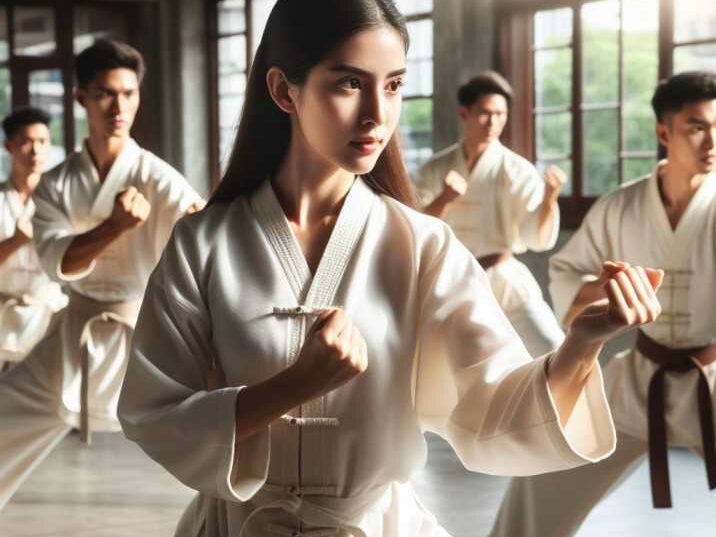Introduction:
Table of Contents
In a world that often values speed and efficiency over depth and character, traditional practices like Kung Fu offer a timeless wisdom that transcends generations. Kung Fu, an ancient Chinese martial art form, is not merely about physical prowess or self-defense; it is a holistic discipline that encompasses mental, emotional, and spiritual development. In this article, we delve into the profound impact of Kung Fu training on character and discipline, exploring how this ancient practice shapes individuals into resilient, disciplined, and honorable individuals.

The Essence of Kung Fu:
Kung Fu, also known as Wushu, is more than just a series of movements or techniques. It is a way of life rooted in centuries of tradition and philosophy. The term “Kung Fu” translates to “skill achieved through hard work and practice,” emphasizing the dedication and perseverance required in its pursuit. Originating in ancient China, Kung Fu traces its roots to the Shaolin Monastery, where it was developed by Buddhist monks as a means of physical and mental training.
Impact of Kung Fu Training on Character and Discipline:
Character Development through Kung Fu
Kung Fu training instills essential character traits that are valuable both on and off the training ground. Discipline is at the core of Kung Fu practice, requiring students to adhere to a rigorous training regimen and maintain focus even in the face of challenges. Through repetitive practice of forms (katas) and techniques, students learn the importance of perseverance and dedication, honing their skills over time. This process fosters resilience as individuals push past their limitations and overcome obstacles, building confidence in their abilities.
Cultivating Discipline through Kung Fu
Kung Fu training provides a structured environment that promotes discipline and self-control. Classes are typically organized with a clear hierarchy of instructors and students, emphasizing respect for authority and fellow practitioners. Students are expected to adhere to a code of conduct that emphasizes respect for oneself and others, as well as a commitment to honor and integrity. These values are reinforced through traditional rituals and customs observed within Kung Fu schools.
Mental and Emotional Benefits
Beyond the physical aspects, Kung Fu offers profound mental and emotional benefits. The practice of controlled breathing techniques (qigong) helps practitioners achieve a state of calmness and mental clarity, reducing stress and anxiety. By cultivating emotional balance, individuals learn to manage their emotions effectively, fostering inner peace and resilience in the face of life’s challenges.

Table of Information Impact of Kung Fu Training on Character and Discipline:
| Character Traits Developed | Key Aspects of Kung Fu Training |
|---|---|
| Discipline | Rigorous training regimen |
| Perseverance | Repetitive practice of forms |
| Resilience | Overcoming obstacles |
| Respect | Hierarchy and etiquette |
| Honor | Code of conduct |
| Emotional Balance | Controlled breathing techniques |
Conclusion:
In Conclusion, What is the impact of Kung Fu training on character and discipline, Kung Fu training builds character and discipline, Kung Fu training transcends mere physical exercise; it is a transformative journey that shapes individuals into disciplined, resilient, and honorable beings. By instilling essential character traits such as discipline, perseverance, respect, and emotional balance, Kung Fu cultivates not only skilled martial artists but also virtuous individuals capable of facing life’s challenges with grace and integrity.
FAQs (Frequently Asked Questions):
- Q: How does Kung Fu differ from other martial arts? A: Kung Fu encompasses a wide range of martial arts styles originating from China, each with its own unique techniques and philosophies. While some martial arts focus primarily on self-defense or competition, Kung Fu emphasizes holistic development of the individual, encompassing physical, mental, and spiritual aspects.
- Q: Can anyone learn Kung Fu? A: Yes, Kung Fu is accessible to people of all ages and fitness levels. With proper instruction and dedication, individuals can gradually progress and improve their skills over time.
- Q: What equipment is needed for Kung Fu training? A: Kung Fu training typically requires minimal equipment, such as loose-fitting clothing (e.g., Kung Fu uniform), training shoes, and sometimes traditional weapons for advanced practice.
- Q: Is Kung Fu training dangerous? A: Like any physical activity, there is a risk of injury in Kung Fu training, especially during sparring or contact drills. However, with proper supervision, adherence to safety guidelines, and gradual progression, the risk can be minimized.
- Q: How long does it take to master Kung Fu? A: Mastery of Kung Fu is a lifelong journey, and the time required varies depending on individual aptitude, dedication, and the specific style of Kung Fu. While basic proficiency can be achieved within a few years of consistent practice, true mastery requires ongoing dedication and refinement.


